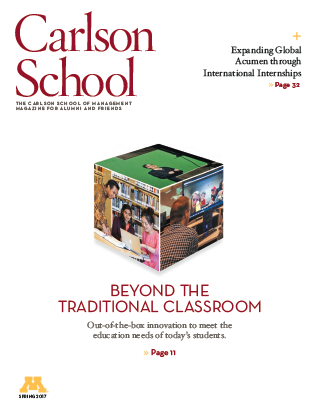
Beyond the Traditional Classroom: Rêve Academy
Thursday, June 1, 2017
Improving technology and changing student attitudes are motivating schools to look beyond the traditional lecture hall. Online classes, hybrids, flipped, compressed – no matter the design, these classes are a response to student demands for flexibility, relevancy, and engagement.
“When students graduate, we want them to be productive, skilled contributors to the workforce and civic life. Their work will not be sitting in a room listening to someone lecture, and then regurgitating memorized facts on tests,” says Strategic Management and Entrepreneurship Senior Lecturer Rand Park.
Kristin Pardue, 98 MBA, ’07 Executive Leadership Program, and husband, Brad Von Bank, ’02 MBA, are in the perfect position to understand the educational needs of today’s students at every level as well as the needs of the companies they will work for.
The duo are co-founders of Rêve Academy, a non-profit organization that teaches digital media skills to students in North Minneapolis, along with exposing them to other critical career experiences.
“We work with students in the fifth through 12th grade who have historically not been on traditional higher education pathways,” Von Bank says. “We’re excited to see a lot of them attend college upon graduation and develop big entrepreneurial dreams for their future.”
Pardue is also the CEO and Von Bank the CBDO of Rêve Consulting, which provides technology solutions for companies. In addition, Pardue leads an annual workshop for MBAs on design thinking, a much-needed subject for students going into strategy, marketing, or technology.
“Today’s students want to curate and personalize their educational experience, tailoring it to what they want to do in the world,” Pardue says. “They can educate themselves through new channels at the push of a button via YouTube or Udacity. So, they don’t always see the relevance of what is being taught in traditional settings with regard to their goals.”
Pardue says she has noticed several drivers behind this new paradigm. First, there is the “self-service” and temporal nature of how people consume information today. Second is the complexity of the world today due to accelerated change and the uncertainty of whether there is such a thing as disruption-proof career tracks. Finally, there is rise of the cost of education coupled with a need for investment in continuous learning. “We have heard from undergrads, graduates, and middle-skilled workers who are currently retraining, that their fears concern the true value of degrees, the availability of jobs on the other side of graduation, and the return on their financial and time investments,” she says.
Von Bank says today’s students are looking for learning experiences that are much more applied, iterative, and multi-modal. “We are seeing an increased desire to engage in the learning process, as well as more comfort with failing and the eagerness to learn from it,” he says.
“Students today have a window into the world that not only allows them to observe change at an incredible pace, but also understand the multi-faceted nature of the global economy.”
-Brad Von Bank, ’02 MBA
To adapt to meet the needs of these students, schools need to push for more interdisciplinary learning, more integrated learning with multiple stakeholders, and a variation of learning modes, Van Bank says. “Some of the ideas we implement at Rêve Academy are applied learning, group work, and creating strong relationships with employers through internships,” Pardue says, adding that there are also opportunities in creating job-relevant and job-ready degrees or certifications that address disruption in specific industries, such as technology or healthcare. “Also, I strongly believe that schools need to foster the development of soft skills in their students, given that employers continue to say that this is a gap they are encountering in their hiring process.”
Companies, for their part, need to focus more on the continued learning of their employees and prioritize the resources needed to allow their workforce to continuously adapt. “Leaders need to understand what competencies in their people are critical to their business success and hire and train for that,” Pardue says. “If they can’t provide the skill development themselves, they need to work closely with educators to develop micro-credentials, certificates, or degree programs that ensure graduates have the skills they want to hire.”
